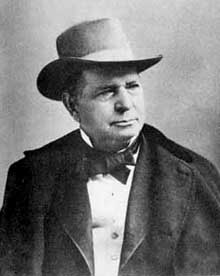Oliver Winchester facts for kids
Quick facts for kids
Oliver Winchester
|
|
|---|---|

Winchester c. 1847
|
|
| 52nd Lieutenant Governor of Connecticut | |
| In office May 2, 1866 – May 1, 1867 |
|
| Governor | Joseph Roswell Hawley |
| Preceded by | Roger Averill |
| Succeeded by | Ephraim H. Hyde |
| Personal details | |
| Born |
Oliver Fisher Winchester
November 30, 1810 Boston, Massachusetts |
| Died | December 10, 1880 (aged 70) New Haven, Connecticut |
| Political party | Republican |
| Spouse |
Jane Ellen Hope
(m. 1834) |
| Children | 3, incl. William |
| Parents | Samuel Winchester Hannah Bates |
| Occupation | Founder, Winchester Repeating Arms Company |
Oliver Fisher Winchester (born November 30, 1810 – died December 10, 1880) was an important American businessman and politician. He is most famous for starting the Winchester Repeating Arms Company, which made very well-known rifles.
Contents
Early Life and Family
Oliver Winchester was born in Boston, Massachusetts, on November 30, 1810. His parents were Samuel Winchester and Hannah Bates.
On February 20, 1834, he married Jane Ellen Hope in Boston. They had three children:
- Ann Rebecca Winchester (1835–1864)
- William Wirt Winchester (1837–1881)
- Hannah Jane Winchester
Building a Business
Winchester first worked as a clothing maker in New York City and New Haven, Connecticut. He later became famous for making and selling the Winchester repeating rifle. This rifle was a much-improved version of an earlier gun called the Volcanic rifle.
Oliver Winchester saw a chance to start a new business. He learned that a part of Smith & Wesson firearms was having money problems. This part was called the Volcanic Repeating Arms Company. In 1855, Winchester gathered money from other investors and bought this company.
By 1857, Winchester became the main owner of the company. He moved the business to New Haven and changed its name to the New Haven Arms Company.
Developing New Rifles
At first, the company did not make much money. This was partly because the Volcanic gun used a weak type of bullet. The bullets were not powerful enough compared to other guns.
Winchester was lucky to have a very smart engineer named Benjamin Tyler Henry. Henry worked to make the Volcanic rifle better. He made the gun's frame and magazine bigger. This allowed it to hold seventeen new, powerful .44 caliber bullets.
This new bullet helped the company become very successful. Henry's clever design was patented on October 16, 1860. This new gun became known as the famous Henry rifle.
The Henry rifle was made for about six years. Around 12,000 of these rifles were produced. After the Henry rifle's success, the company changed its name again. It became the Winchester Repeating Arms Company.
In 1866, another employee, Nelson King, made more improvements. He added a loading gate on the side of the gun. This made it easier to load. He also covered the magazine with a wooden fore stock. The first Winchester rifle was the Model 1866. People often called it the "Yellow Boy" because of its brass frame.
The "Gun That Won the West"
Repeating rifles were used a little during the American Civil War. However, the United States Army did not use many of them. They were a new technology that had not been fully tested yet.
Repeating rifles became very popular after the war, especially with regular people. The military continued to focus on single-shot rifles for many more years.
With thousands of these rifles in the hands of pioneers exploring the American West, Winchester repeating rifles gained a famous nickname. They were known as "the gun that won the West."
Political Life
Besides his business, Oliver Winchester was also active in politics. He served as a City Commissioner in New Haven. In 1864, he was a Republican Presidential elector. From 1866 to 1867, he served as the Lieutenant Governor of Connecticut.
Later Years and Legacy
Oliver Winchester passed away on December 10, 1880. His ownership of the company went to his son, William Wirt Winchester. Sadly, William died from tuberculosis just a few months later.
William's wife, Sarah, inherited a large fortune. She moved to San Jose, California. There, she began building a very unusual mansion. This house is now famous as the Winchester Mystery House.
See also
 In Spanish: Oliver Winchester para niños
In Spanish: Oliver Winchester para niños
| Business positions | ||
|---|---|---|
| Preceded by Founder |
President of Winchester Repeating Arms Company 1857–1880 |
Succeeded by William Wirt Winchester |
| Political offices | ||
| Preceded by Roger Averill |
Lieutenant Governor of Connecticut 1866–1867 |
Succeeded by Ephraim H. Hyde |
 | Jackie Robinson |
 | Jack Johnson |
 | Althea Gibson |
 | Arthur Ashe |
 | Muhammad Ali |

